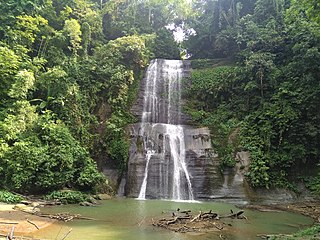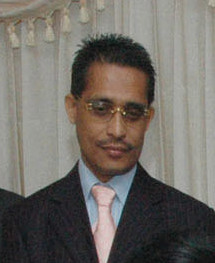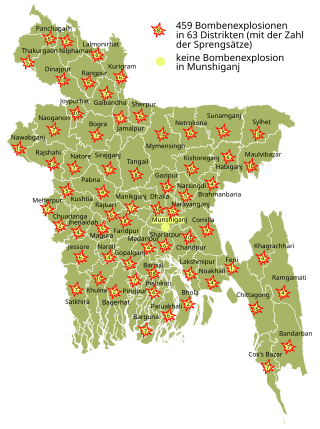Related Research Articles

Moulvibazar, also spelled Moulabhibazar,Maulvibazar, Moulavibazar, and Maulavibazar, is the southeastern district of Sylhet Division in northeastern Bangladesh, named after the town of Moulvibazar. It is bordered by the Indian states of Tripura and Assam to the south and east, respectively; by the Bangladeshi districts of Habiganj to the west and Sylhet to the north.

Bishwanath is an upazila of Sylhet District in the Division of Sylhet, Bangladesh.
Jalalabad Ragib-Rabeya Medical College (JRRMC) is a private medical school in Bangladesh, established in 1995. It is located in the Pathantula area of Bimanbandar Thana, in Sylhet. It is affiliated with Shahjalal University of Science and Technology (SUST) under the School of Medical Sciences. The college is associated with 925-bed Jalalabad Ragib-Rabeya Medical College Hospital.
Badar Uddin Ahmed Kamran was a Bangladeshi politician and the first mayor of Sylhet City, a role he was elected to twice. In 2013, he lost to Ariful Haque Choudhury by nearly 3,000 votes. He was also a member on the standing committee of Awami League. He died on 15 June 2020, from COVID-19 at the age of 69.

M Ilias Ali was a Bangladeshi politician and member of the Jatiya Sangsad (2001–2006) representing the Sylhet-2 constituency. He served as the organising secretary of the Bangladesh Nationalist Party.

Salahuddin Quader Chowdhury was a Bangladeshi politician, minister and six-term member of Jatiya Sangsad and member of the Bangladesh Nationalist Party (BNP) Standing Committee, who served as the adviser of parliamentary affairs to Prime Minister Khaleda Zia in from 2001 to 2006. On 1 October 2013 he was convicted of 9 of 23 charges and sentenced to death by the International Crimes Tribunal of Bangladesh for crimes during the 1971 Bangladesh War of Independence. However, limitations placed on his defense testimony were called "disturbing" and the trial was politically motivated.

Lutfozzaman Babar is a Bangladeshi politician, who served as the State Minister of Home Affairs in the Khaleda Zia Cabinet from 2001 to 2006, as a member of the Bangladesh Nationalist Party (BNP).

Mohammad Mosaddak Ali, also known as Phalu, is a Bangladeshi entrepreneur and a politician who was a former parliamentarian from Bangladesh Nationalist Party (BNP). He served as the political secretary to the Prime Minister of Bangladesh Begum Khaleda Zia between 2001 and 2004. He was responsible for building special relations and partnership for development between the government and the private sector that is interested in investing in new and highly potential industrial sectors, and introducing new products and services to local industries, at a time when Bangladesh's economic growth accelerated. In 2003, Ali launched Bangladesh's first automation-based private satellite television station NTV. He also founded another satellite channel RTV and Bengali daily newspaper Amar Desh. He is the founding President of Association of Television Channel Owners (ATCO).

Nurul Islam Babul was a Bangladeshi business magnate. He was the founder and chairman of the business conglomerate Jamuna Group.
Ahmed Rajib Haider was a Bangladeshi atheist blogger. He used to blog in the blogging communities namely somewhereinblog.net, amarblog.com and nagorikblog.com and used the pseudonym Thaba Baba.

Bangladesh has experienced terrorism in the past conducted by a number of different organisations. In the past, both ISIL and other terrorist organisations had claimed to be active in the country. However, the Bangladeshi government believes that they mainly operated through local affiliates, before being neutralised by security forces.
Kazi Zafarullah is a Bangladeshi industrialist and politician. He is a presidium member of Bangladesh Awami League, its central executive committee. He was Member of Parliament from Faridpur-4.
Haji Mohammad Salim is a Bangladesh Awami League politician and a former Jatiya Sangsad member representing the Dhaka-7 and Dhaka-8 constituencies.
Amanur Rahman Khan Rana is a Bangladesh Awami League politician and a former Jatiya Sangsad member representing the Tangail-3 constituency.
Dabirul Islam is a Bangladesh Awami League politician and the incumbent Jatiya Sangsad member representing the Thakurgaon-2 constituency since 1996, during 1991–1996 and 1986–1988. He is chairman of the Standing Committee on Ministry of Chittagong Hill Tracts Affairs. He is a 7-term Jatiya Sangsad member representing the Thakurgaon-2 constituency.
HBM Iqbal is a Bangladeshi entrepreneur and the founder chairperson of Premier Group of Companies Ltd. He is also a Bangladesh Awami League politician and a former Jatiya Sangsad member representing the Dhaka-10 constituency during 1996–2001.
Abul Harris Chowdhury was a Bangladeshi and politician who served as the Political Secretary of Prime Minister Begum Khaleda Zia. He was the Joint Secretary General of Bangladesh Nationalist Party. Chowdhury was sentenced to 65 years in total and a life term in prison in absentia for allegedly committing multiple crimes. His party alleges the charges were falsely given, along with those against Khaleda Zia's son Tarique Rahman, and many other senior party members.

MoslemuddinKhan, also known as Rafiqul Islam Khan, is a junior-commisioned officer of the Bangladesh Army who was convicted for his role in the 15 August 1975 Bangladeshi coup and the subsequent jail killings. He was sentenced to death in absentia and is currently a fugitive.
Banshkhali carnage was a targeted killing of 11 members of a Hindu family to grab their land in Bangladesh. There has been no verdict in the criminal case filled over the incident. The accused in the case include politicians of Bangladesh Nationalist Party.
References
- ↑ "Industrialist Ragib Ali sued". The Daily Star . Bangladesh. 31 January 2009. Retrieved 24 April 2011.
- ↑ "Land grabbing: Ragib Ali lands in jail". UNB. Retrieved 24 November 2020.
- 1 2 3 Karim, Mohammed Abdul; Karim, Shahadoth (July 2008). British Bangladeshi Who's Who (PDF). British Bangla Media Group. p. 44. Retrieved 1 May 2012.
- ↑ "Industrialist Ragib Ali sued". The Daily Star. 31 January 2009. Retrieved 25 February 2018.
- ↑ "Our Hindu problem". bdnews24.com (Opinion). 23 May 2016. Retrieved 9 April 2017.
- ↑ "Land grabbing: Sylhet industrialist Ragib Ali gets 14yrs' jail". The Daily Star. 6 April 2017. Retrieved 9 April 2017.
- ↑ "Ragib Ali gets 14 yrs jail in land grabbing case". Prothom Alo. Retrieved 9 April 2017.
- ↑ "Industrialist Ragib Ali, son released from Sylhet jail". Dhaka Tribune. 29 October 2017. Retrieved 13 May 2018.
- ↑ "Sylhet industrialist Ragib Ali, family flee to India to evade arrest over Hindu land grabbing". bdnews24.com. 13 August 2016. Retrieved 5 November 2018.